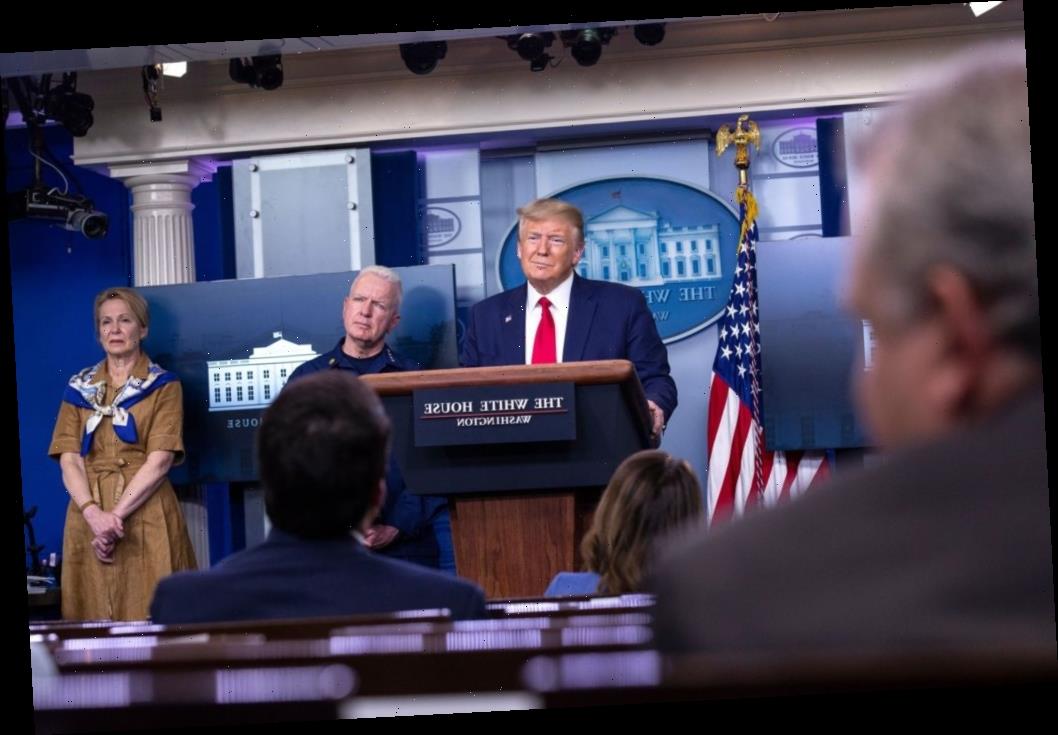President Donald Trump spent the Q&A portion of his daily coronavirus press briefing on Monday by attacking reporters not for their recent stories, but for the way that they are asking their questions.
“It’s such a positive event and you ask it in such a negative way,” he complained to McClatchy’s Francesca Chambers, who had asked about glitches in the rollout of the small business loan program.
“You should say, ‘congratulations, great job,’ instead of being so horrid in the way you ask a question,” he told Fox News’ Kristin Fisher, who had asked about testing shortages.
He lit into ABC News’ Jonathan Karl, who had asked him about a Health and Human Services inspector general report on hospitals’ lack of medical supplies.
“You’re a third rate reporter,” Trump told Karl. “You’ll never make it.”
Karl, who is this year’s president of the White House Correspondents’ Association, has known Trump for years, back when he was a reporter for the New York Post and Trump was the showy real estate developer.
Were we not in the midst of a national emergency and global epidemic, none of these nightly Trump tiffs with reporters would be surprising or perhaps even newsworthy. He’s been using the media as his foil from the start of his political career, and the coronavirus press briefings are now his primary platform to offer his version of events.
What was different on Monday was that, one after another, reporters had questions that challenged Trump’s insistence that everything is going just fine on the federal level even as the immediate prospects are grim. “Things are going really well,” Trump said. “Light at the end of the tunnel.”
Yes, there is some good news — albeit it may be a bit premature — as New York and Louisiana offer some hopeful signs of a slowdown in cases and new hospitalizations. But the U.S. passed more than 10,000 deaths from the coronavirus, and members of Trump’s task force warned that this will be a very difficult two weeks.
“This is going to be our Pearl Harbor moment, our 9/11 moment, only it’s not going to be localised. It’s going to be happening all over the country. And I want America to understand that,” Surgeon General Jerome Adams warned on Sunday.
Trump and his supporters say that these expressions of positivity are what’s needed for the country at this bleak moment.
Ari Fleischer, press secretary for George W. Bush during 9/11, argued over the weekend in a USA Today op ed that the press is too fixated on the worst case scenario and what is going wrong when what the public needs is reassurance. He wrote that “if this becomes a fight between a president who realistically represents hope and reporters who reject it, that’s a fight the press can’t win.”
But on Monday, the questions being asked of Trump were ones that mirror pragmatic public concerns of the crisis at hand.
The SBA says that there have been $4.3 billion in loans as part of its paycheck protection program, but there also are reports of glitches and slowdowns in distributing money. Trump says that there have been 1.79 million tests, more than any other country, but hospitals and doctors still report being overwhelmed by demand.
The HHS inspector general report, meanwhile, had to do with whether hospitals have the tools they need to fight the virus. Trump outlined a list of steps the administration to get supplies where they are needed, but it’s hardly out of bounds for a reporter to ask a question about a government study on that very issue.
Instead, Trump dismissed it and suggested that its author was political biased, even though she started her career with the office in 1999 and was appointed to her current role just a few months ago.
“Did I hear the word inspector general, really?” Trump said in indignation, an obvious reference to fire the intelligence community’s inspector general, Michael Atkinson, on Friday for his role in alerting Congress to the Ukraine whistleblower’s complaint.
There is pressure on broadcast and cable news networks to stop covering Trump’s press briefings live, as critics complain that they have become a blizzard of misinformation and misleading statements, or, as it was on Monday, a scolding to the nattering nabobs of negativism.
The FCC announced on Monday that it isn’t going to touch the issue, but at the networks, more on-air personalities are speaking out in favor of a more judicious approach to covering the briefings, which have stretched to two hours.
“Donald Trump’s treatment of Jonathan Karl is predictably disgraceful. Why is anyone carrying this farce live?” Joe Scarborough of MSNBC’s Morning Joe tweeted.
Most recently, CNN and MSNBC have been taking kind of a herky jerky approach to that question — going live to the briefing then cutting away.
At one moment on Monday, it looked as if CNN would skip Trump’s entire opening statement and wait until he took questions, before Wolf Blitzer abruptly announced to viewers that no, they were joining those remarks in progress. They stayed for a while, then cut away again, then returned for the Q&A. Given the nature of the briefings, that’s probably the way it will be for the time being.
Source: Read Full Article
